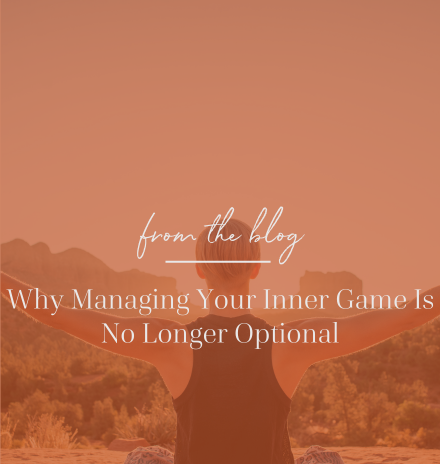Why Managing Your Inner Game Is No Longer Optional

Dear friend,
I had something entirely different planned to write this week. But honesty won out, and what’s been on my mind lately felt more important to share.
Because the reality is this: life can be dysregulating. And in those moments, our job is to stay connected to ourselves.
With my last child back to school this week, I’ve been reflecting on summer. There were highlights — jet skiing across Lake Minnetonka, pool days, and late-night movies as a family. And there were lows — my son’s broken collarbone and other extended family health concerns.
I’ve always prided myself on making the best of unexpected turns. I often joke that if you locked me in a bathroom with a stack of books and a phone, I could enjoy myself for weeks. But lately, change has felt different. Sometimes the upsets are bigger. The feelings are deeper. The reverberations are more significant.
Life is hard. It is complex.
Just this week, I stepped off a client call to a flood of texts: Was it my son’s school affected by the Minneapolis shooting? Only days before, I’d learned of a shooting threat at the University of South Carolina — where my daughter attends — which thankfully turned out to be a hoax. And closer to home, I felt the disappointment that the Chicago I once felt safe in is not the same city where my oldest daughter will live.
It’s in times like these that our habits and coping mechanisms matter most. Because how we automatically respond can either support our nervous system, or quietly make life harder.
When I heard about the school shooting, my body flooded with cortisol. Anger erupted — the kind I hadn’t felt in years. (My kids would call it “crashing out.”) I called a friend and unloaded. That’s my nervous system’s fight response. But the problem? It lasted all day.
We all have our protective patterns when we don’t feel safe— numbing out, people-pleasing, armoring up, over-controlling. They are adaptive. Necessary. Even genius. But they’re meant to be temporary — minutes or hours, not days, weeks, or years. Yet for many of us, fight, flight, freeze, or fawn has become a way of life.
The gift of self-awareness is that it gives us a choice.
The next morning, instead of diving into my checklist, I went to the lake for sunrise. Water has always calmed me, and I knew I needed a reset. I made my apologies where needed. I acknowledged my feelings instead of ignoring them. I didn’t numb with wine or weaponize with words. I didn’t over-control. Within 24 hours, I was closer to grounded and compassion-focused again.
This is the practice of managing your inner game.
Too often, when our minds register danger, we rush to stop it at all costs. But those instinctive responses are fear running the show. Left unchecked, they don’t just protect us — they can erode relationships, dilute our mission, and steal our happiness.
To create and enjoy the life we want requires cultivating internal safety. So that when the world feels chaotic, we still have a quiet place to return to.
This is where I am supposed to tell you exactly how to do this in a neat, short paragraph. I can’t because it’s slow and ongoing.
What I can tell you is that when we don’t let every unexpected event that our mind tells us is threatening dismantle everyday life, we are no longer controlled by circumstances.
That steadiness is not just the key to good living — it’s the foundation of great leadership.
Too many of us accept our stress responses as “just who I am,” never realizing the toll until it’s too late.
But here’s the bottom line: managing your inner game is not a luxury anymore. It’s a necessity for those who want to live and lead meaningfully.
Because when you learn to interact with yourself and others from a regulated place, you improve everything — your energy, your impact, your performance — in any situation, whether ordinary or crisis.
And that changes everything.
With you in it,
~Rita


Leave a Reply
Want to join the discussion?Feel free to contribute!